More babies than you think experience delayed gross motor skills.
What are they, exactly? Well, a baby is expected to reach certain milestones within a preestablished timeframe. If your baby is having difficulty reaching these milestones, it may be due to gross motor delay. However, sometimes it’s just a matter of time.
Every baby is different and every baby develops at a different pace.
Parents get panicky when it comes to their children. Nevertheless, if you have worries about your baby’s physical development, make sure to consult a pediatrician.
Delayed gross motor skills imply motor skills such as crawling, walking, running and even standing. If you find that your baby is experiencing delayed gross motor skills, it helps to expand your knowledge on the topic before we get ahead of ourselves.
Gross motor delay in infants can cause them to have trouble lifting their head, as well. However, these delays are age-appropriate, which means that you should first familiarize yourself with your child’s development milestones, starting from the first six months.
Gross Motor Milestones: First 6 Months

From the moment your baby is born, their development begins.
Their muscles start to grow as they progress physically. As such, during the first six months, you should expect your baby to master the following gross motor skills:
- During this time, you should expect your baby to learn how to bring their hands and feet to their mouth while lying on their back.
- They should be able to roll over.
- Within the first six months, a baby should be able to sit with support.
- They should also have the strength to hold their head up.
- Additionally, you should expect your baby to be able to push themselves up while lying flat on their tummy.
Naturally, every baby develops at a different pace. So, you don’t have to be impatient. Take the time to observe your baby. However, if your baby is struggling to do these things after the first six months, they may be experiencing delayed gross motor skills.
It helps to know that there are many causes of gross motor delay, and, therefore, it’s advised that you should consult your pediatrician as soon as possible for further guidance.
Of course, many treatments exist to help you restore strength to your baby’s muscles and to help improve their movement. That’s why it’s important that you don’t delay your doctor’s appointment. That way you can stay on top of things in no time at all.
But, what about after the first six months?
Gross Motor Milestones: 6 to 12 Months

So far so good, right? Well, gross motor delay can occur in infants at a later stage of their babyhood, after the first six months. During this stage of your baby’s development, your baby should be able to complete the following movements and activities, such as:
- At this time, your baby learns how to crawl on their belly.
- They also learn how to sit independently.
- During this time, your baby starts to creep on their hands and knees.
- Later on, your baby finds enough strength to pull themselves into a standing position.
- At the end of this stage, your baby takes its first steps.
All these achievements can happen earlier or later. If your baby happens to miss a milestone, you don’t have to slam the panic button. Give it time, but keep observing. It’s through observation that you can spot the first signs of delayed gross motor skills.
In infants, gross motor skills can be difficult to detect. Although there are many causes of gross motor delay, you can rest assured that there just as many treatments.
So, even if your baby turns out to be struggling developing their muscles, there’s nothing for you to worry about. With the right treatment, you can ensure your baby’s growth.
What milestones can you expect after the first year?
Gross Motor Milestones: 1 to 2 Years

After the first year, many important developments happen.
Some milestones your baby reaches sooner and some later, but during this one year period of their life it’s important that you keep your baby active in order to help them reach these milestones. At this stage, it also gets a little bit easier to spot delayed gross motor skills.
Expect your baby to be able to do the following feats:
- By now, your baby should be able to walk, crawl and sit independently.
- Expect your child to learn how to walk while carrying a toy.
- During this period, a baby can stand without support.
- Your child should also start mimicking your motor skills.
- Although clumsily at first, your baby should be learning how to run.
Keep in mind that if your baby doesn’t meet a certain milestone, it doesn’t necessarily imply delayed gross motor skills. Especially when it comes to crawling, infants develop this skill at varying ages, so it can be a matter of time, and not, in fact, gross motor delay.
Even though your child continues to grow and develop after the first two years, accomplishing new feats and reaching new milestones, this article in particular focuses on gross motor delay in infants, and, as such, we won’t list milestones after the second year.
Nevertheless, every parent has a responsibility to observe their child.
So, what are the first signs of delayed gross motor skills in infants?
First Signs of Delayed Gross Motor Skills
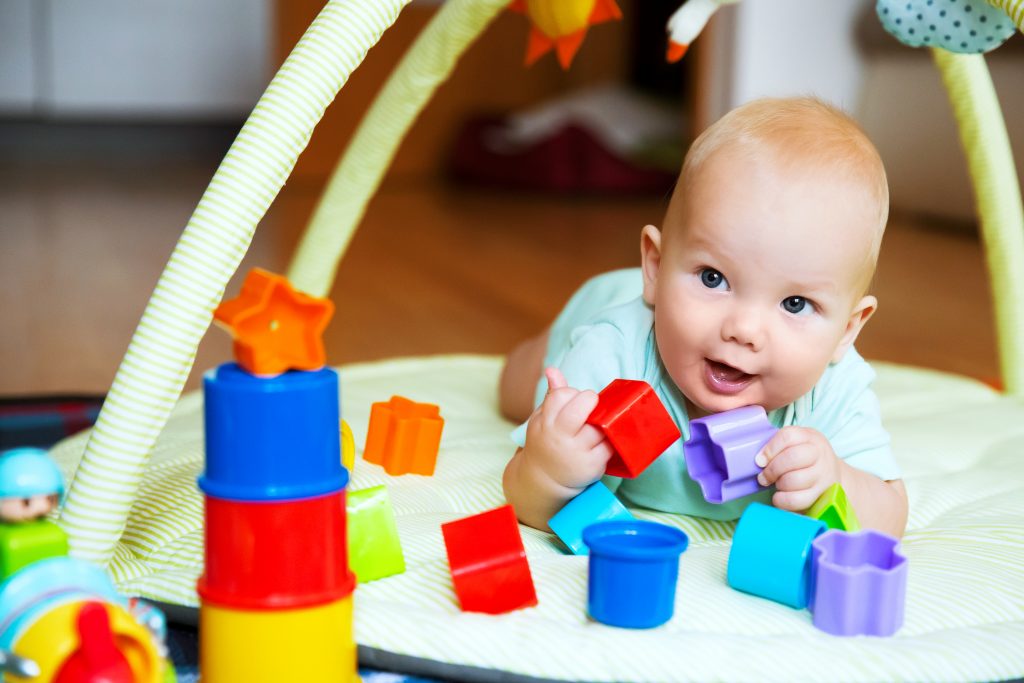
Like we said, if your child isn’t reaching milestones, it doesn’t necessarily imply gross motor delay. However, it’s something that you have to keep in mind. Let’s take a moment to examine other signs that may hint at your baby having delayed gross motor skills.
What exactly causes delayed gross motor skills?
Premature birth can cause your baby’s muscles to develop more slowly. So, if your baby was a little bit too eager and impatient to see the world, we advise paying close attention to your baby’s motor skills, so that you can distinguish any irregularities on time.
Additionally, developmental conditions cause gross motor delay in infants. In particular, autism and cerebral palsy can significantly hinder motor functioning in babies.
Genetic syndromes cause gross motor delay, as well.
For example, Down syndrome or Pitt-Hopkins syndrome lead to intellectual and physical disability. Although these symptoms are quite rare, they’re easier to notice, but you should always turn to genetic analysis and testing before drawing your own conclusions.
Finally, delayed gross motor skills in infants can also be a result of a lack of activity. Even though your baby won’t exactly be jumping over hurdles, every child needs a safe environment that simulates their little muscles in order to prevent motor delays.
Pay attention to your baby. Does your baby have stiff muscles? Their limbs and trunks, are they loose? All of these questions in regards to your baby’s movement and strength can help you discern whether your baby is experiencing delayed gross motor skills.
Development delay comes in many shapes and forms.
As such, you have a responsibility as a parent to keep a close eye on your baby’s growth. Be observant, but be equally wary of drawing your own conclusions. After all, parents get panicky. Talk to a pediatrician if you have any notable observations or concerns.
Treatments For Delayed Gross Motor Skills
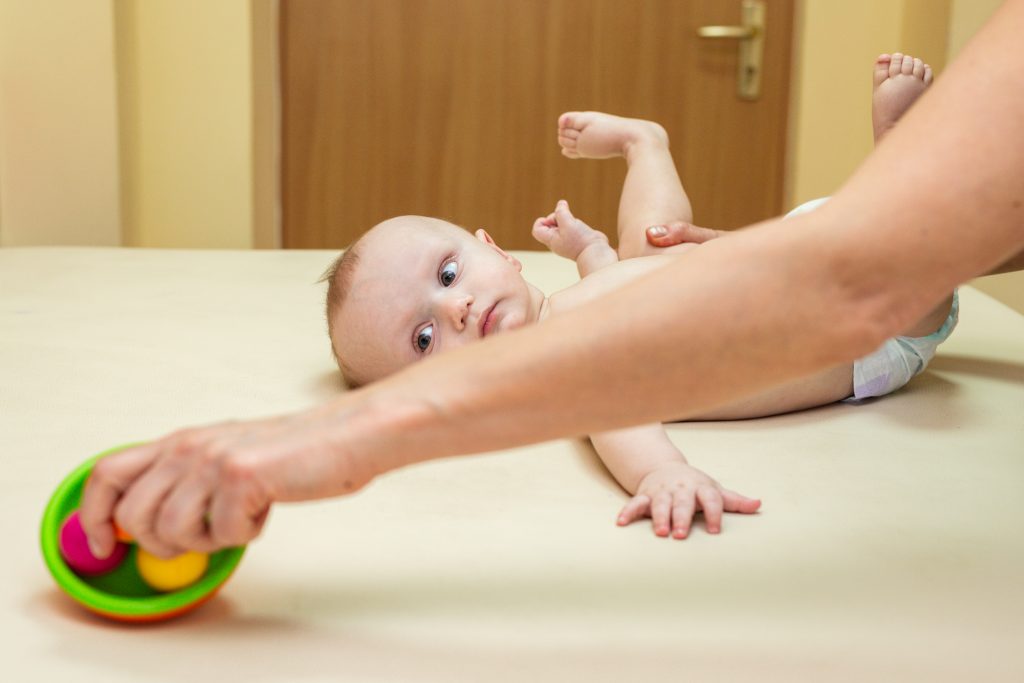
Treatments for delayed gross motor skills vary from infant to infant.
Depending on the cause of gross motor delay, your baby gets an individualized treatment. What does that mean? Well, it includes various treatment options that usually involve occupational therapy that engages your baby in meaningful activities.
Other types of treatment include physical therapy and sensory-processing therapy.
Naturally, your pediatrician guides you through the process.
The most important thing is that you stay calm, so that your baby can benefit from your stable and positive energy. Keep in mind that children need exercise and activity. As a parent, it falls to you to ensure safe and healthy activities for your precious baby.
Here’s a few things that you can do to help your child develop physically:
- Keep your baby active and energized with age-appropriate activities.
- Work on teaching your child how to balance themselves.
- Learn how to massage your baby’s muscles.
- When they’re ready, teach them how to throw and bounce balls.
- Use age-appropriate toys to help stimulate development.
- Make sure that your baby gets enough tummy time.
- Activate their senses.
- Communicate with your baby as much as possible.
On top of all of that, provide a safe and healthy environment for your baby to develop.
Even though babies don’t move around all that much, every little movement activates their muscles and helps them develop. To avoid gross motor delay in infants, you want to make sure that your baby gets all the exercise they need, including age-appropriate toys.
In Conclusion
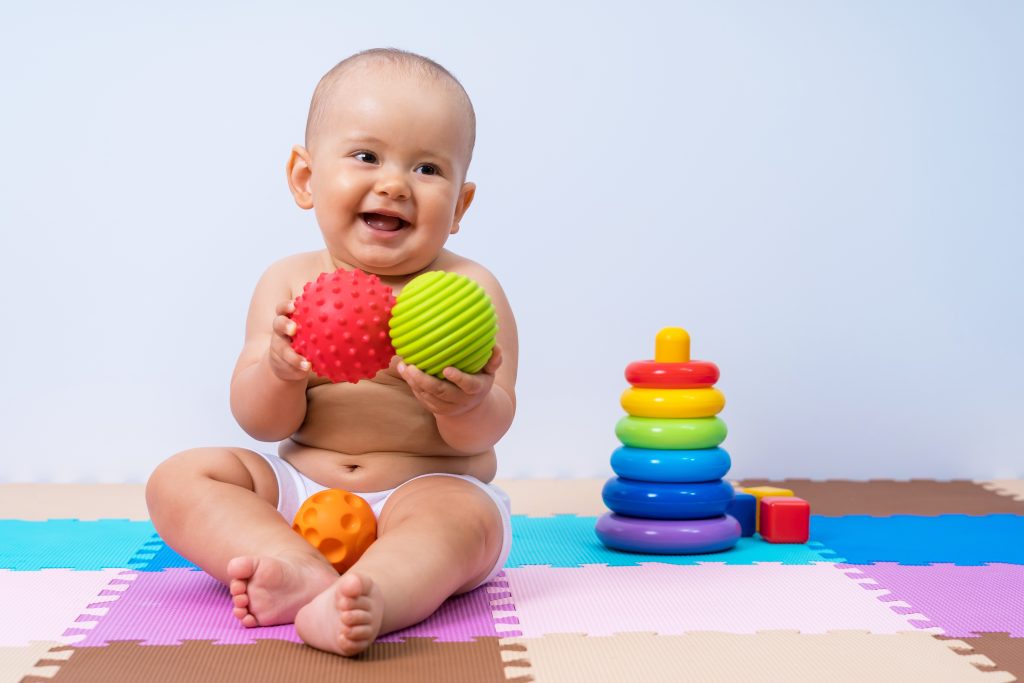
If you have a strong reason to believe that your child has delayed gross motor skills, consult a pediatrician as soon as possible. As with any kind of medical condition, early treatments yield better results. Besides, seeing a specialist can put your mind at ease.
We all worry about our children. Gross motor delay in infants poses a serious concern, so even if you have the slightest hint of doubt, we advise taking the time to schedule an appointment with your pediatrician. From there on, you get all the information you need.
There’s much you can do yourself to keep your baby physically healthy and active, as covered in this article. If your baby receives this kind of diagnosis, you may at first feel overwhelmed. Rest assured, however, that the right treatments make a big difference.
Keep observing your baby and providing them with all the love and support they need. Your child’s safety and development is your primary responsibility. Educating yourself about delayed gross motor skills allows you to help your child develop optimally.
Remember, also, that sometimes it just takes a little bit of time and patience.

Mother of three and a primary school teacher. I’ve always loved being around children and helping them, so I chose my path as a teacher. It is sometimes hectic with three children, but I am 100 percent into it and wouldn’t change it for anything in the world.

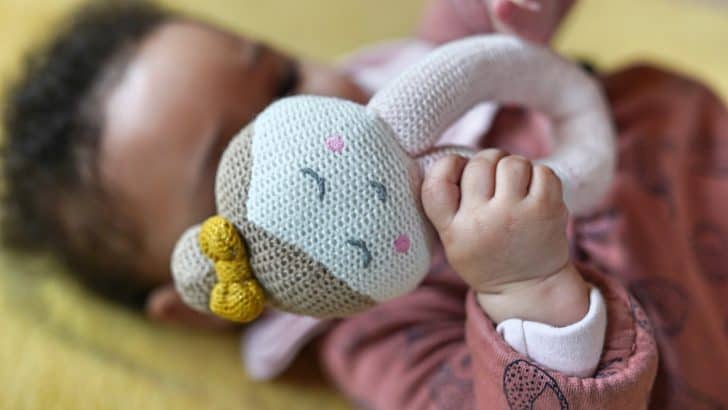
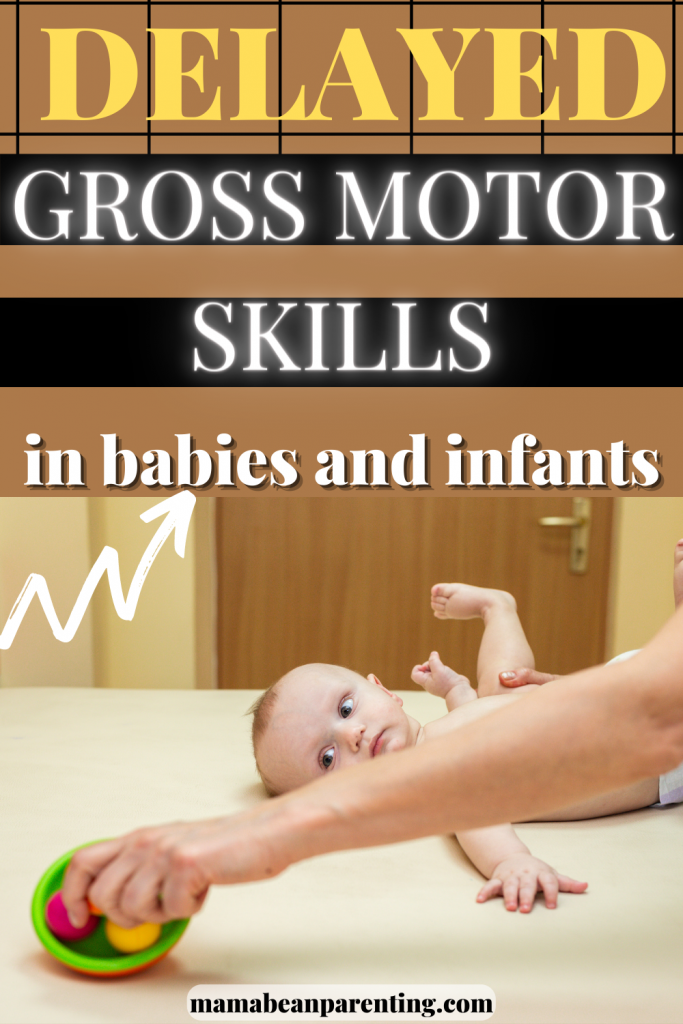
Feeding Aversion: All You Need to Know • Mama Bean Parenting
Monday 17th of April 2023
[…] They may even object to you washing their teeth with a toothbrush, depending on the severity of the issue. Other symptoms include coughing, choking and delayed growth. […]
Asymmetrical Crawling: All You Need to Know • Mama Bean Parenting
Monday 27th of February 2023
[…] If left untreated, asymmetrical crawling can lead to delayed physical development. […]
Bumbo Seat Age Recommendations: A Comprehensive Guide • Mama Bean Parenting
Tuesday 31st of January 2023
[…] Overdoing it may even lead to delayed gross motor skills. […]
Practical Gifts For A 2-Year-Old • Mama Bean Parenting
Thursday 26th of January 2023
[…] This table can help if the child is struggling with delayed gross motor skills. […]
Baby Leaps: The 10 Mental Leaps in Your Baby’s Journey • Mama Bean Parenting
Wednesday 18th of January 2023
[…] we all expect that development to go easy, sometimes those skills are delayed, so make sure to learn about that […]